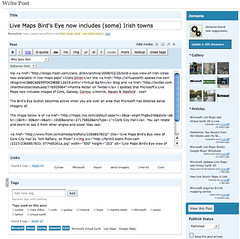
I found this text on Web English Teacher and found it quite amusing. Makes me understand why those of us who are not native speakers get confused by the English language.
"There's no egg in eggplant nor ham in hamburger; neither
apple nor pine in pineapple.
English muffins weren't invented in England or French fries in
France. Sweetmeats are candies while sweetbreads, which aren't sweet,
are meat.
We take English for granted. But if we explore its paradoxes,
we find that quicksand can work slowly, boxing rings are square, and a
guinea pig is neither from Guinea nor is it a pig.
And why is it that writers write but fingers don't fing,
grocers don't groce and hammers don't ham? If the plural of tooth is
teeth, why isn't the plural of booth beeth? One goose, two geese.
So one moose, two meese? One index, two indices?
Doesn't it seem crazy that you can make amends but not one
amend, that you comb through the annals of history but not a single
annal? If you have a bunch of odds and ends and get rid of all but
one of them, what do you call it?
If teachers taught, why didn't preachers praught? If a
vegetarian eats vegetables, what does a humanitarian eat? If you
wrote a letter, perhaps you bote your tongue?
Sometimes I think all the English speakers should be committed
to an asylum for the verbally insane. In what language do people
recite at a play and play at a recital? Ship by truck and send cargo
by ship? Have noses that run and feet that smell? Park on driveways
and drive on parkways?
How can a slim chance and a fat chance be the same, while a
wise man and a wise guy are opposites? How can overlook and oversee
be opposites, while quite a lot and quite a few are alike? How can
the weather be hot as hell one day and cold as hell another?
Have you noticed that we talk about certain things only when
they are absent? Have you ever seen a horseful carriage or a strapful
gown? Met a sung hero or experienced requited love?
Have you ever run into someone who was discombobulated,
gruntled, ruly or peccable? And where are all those people who ARE
spring chickens or who would ACTUALLY hurt a fly?
You have to marvel at the unique lunacy of a language in which
your house can burn up as it burns down, in which you fill in a form
by filling out and in which an alarm clock goes off by going on.
English was invented by people, not computers, and it reflects
the creativity of the human race (which, of course, isn't a race at
all).
That is why, when the stars are out, they are visible, but when
the lights are out, they are invisible. And why, when I wind up my
watch, I start it, but when I wind up this essay, I end it!"








